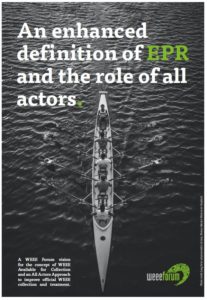 17/11/2020
17/11/2020Most Member States of the European Union will not reach the 2019 WEEE collection targets.
In a report to be released on 24th November investigating the reasons why the targets are seemingly difficult to attain, the United Nations Institute for Training and Research (UNITAR) notes that there is a huge amount of collected WEEE that is not reported. It goes on to assert that all actors that can influence collection rates should hold responsibility and not just the Producer Responsibility Organisations (PROs) and the manufacturers they represent. Furthermore, a vision paper based on UNITAR’s research and produced by the WEEE Forum, a leading representative of PROs throughout the world, outlines the fundamentals of a new policy approach it believes is needed to increase reported collection of WEEE.
The research and its conclusions, along with the WEEE Forum’s vision paper, will be discussed further in a webinar to be held on the 24th November. Among the speakers and panellists at the event will be Thomas Lindhqvist, the person credited with introducing the concept of Extended Producer Responsibility, as well as Mattia Pellegrini of the European Commission’s DG Environment. Joining them will be representatives of the PROs and the manufacturing sector who will discuss the current climate and the vision that the WEEE Forum presents in its paper (register for free here).
In 2002, EU legislation entered into force that was designed to foster environmentally sound management of electronic waste. It made Member States responsible for reaching WEEE (Waste Electrical and Electronic Equipment) collection targets while producers of electronics were required to finance the management of the WEEE deposited at collection facilities. Ten years later, the Directive was recast requiring that from 2019, the minimum collection rate to be achieved annually is 65% of the average weight of electricals placed on the market in the three preceding years, or alternatively 85% of WEEE generated.
All Member States have put the EU law into practice. Enormous progress has been made during this time in tackling the challenge. For example, 48 million tonnes of WEEE were reported as collected in the EU between 2005 and 2018. However, after so many years of concerted effort, most Member States have not attained the 2019 collection targets.
Producers and PROs, and other actors in the value chain, have made huge efforts in better understanding why reaching the increased collection targets is so difficult and where the undocumented WEEE is going. Too much e-waste is currently disposed of in the general waste bin, mixed with metal scrap, illegally exported, and handled irresponsibly.
Says Kees Baldé, chief author of the report: “One of the key principles of WEEE legislation must be that all actors that can influence collection rates should hold responsibility, cooperate and get their access to the WEEE that is generated. We call this the “All Actors Approach”.”
Building on this research the WEEE Forum proposes in its vision paper, “An enhanced definition of Extended Producer Responsibility and the role of all actors”, also due for release on 24th November, that for the reported, official tonnages to go up, Member States should introduce a range of supporting measures that act as a catalyst to improvement. It follows this, however, by noting that these supporting measures are not a guarantee for attaining collection targets and there are number of fundamentals that need to be included in a new policy approach.
Pascal Leroy, Director General of the WEEE Forum, states, “Based on the UNITAR research and the collective experience of the PROs in the WEEE Forum, we assert that a constructive assessment into how fit for purpose the collection targets are is now required. Considering almost two decades of implementation of WEEE legislation and the changing nature of electrical and electronic equipment coming onto the market, this assessment will ensure that the approach to WEEE is brought up to date and is more effective now and in the future. This rings true for any country which currently has or is planning to introduce extended producer responsibility in the sector and our recommendations are equally applicable outside the EU.”
About
The WEEE Forum a.i.s.b.l. is an international association representing 51 producer responsibility organisations across the globe. Together with our members, we are at the forefront of turning the extended producer responsibility principle into an effective electronic waste management policy approach through our combined knowledge of the technical, business and operational aspects of collection, logistics, de-pollution, processing, preparing for reuse and reporting of e-waste. Our mission is to be the world’s foremost e-waste competence centre excelling in the implementation of the circularity principle.
Transparency Register ID 702397445-73.
Copyright 2019 All Rights Reserved
Contact
BluePoint conference and
business centre
Boulevard Auguste Reyerslaan 80
B-1030 Brussels
Belgium
Newsletter
Subscribe to our mailing list to get the updates to your email inbox.